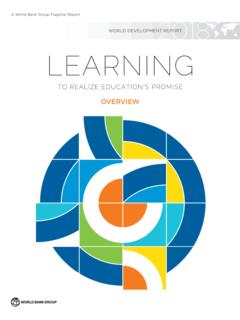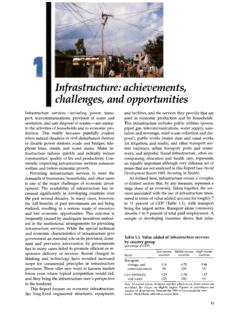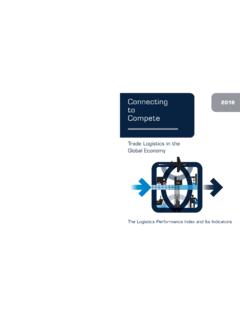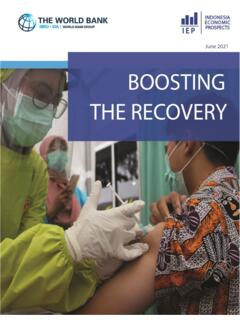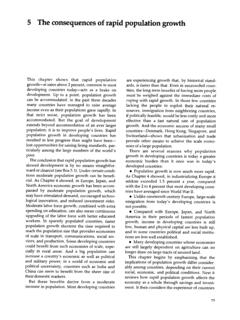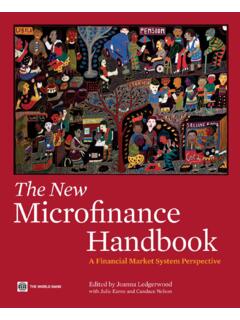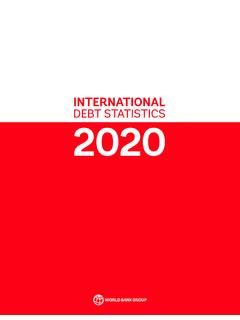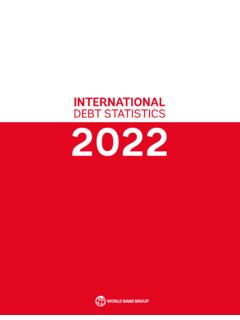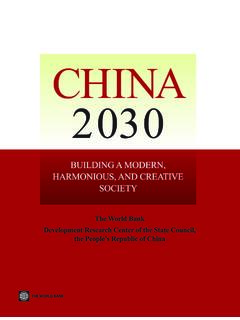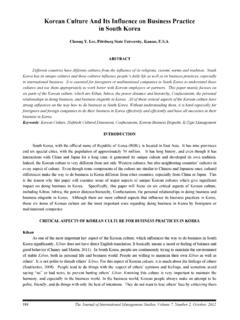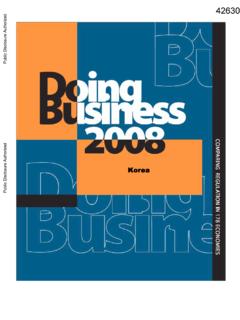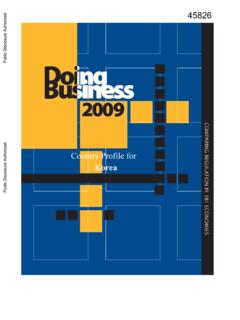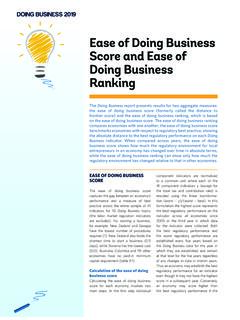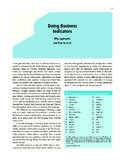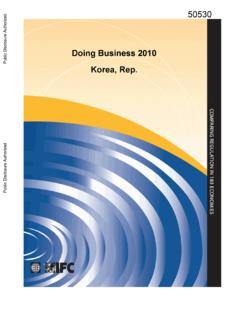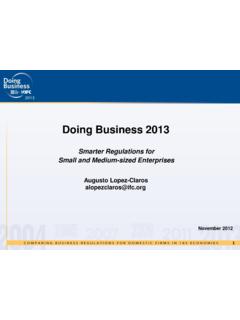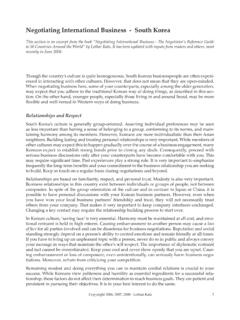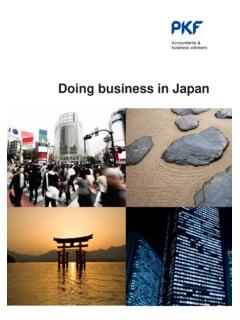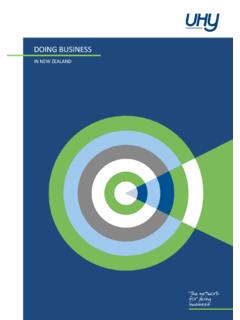Transcription of Doing Business 2014 - openknowledge.worldbank.org
1 Doing Business 2014 Comparing Business Regulations for Domestic Firms in 189 Economies 11TH EDITION A World Bank Group Corporate FlagshipUnderstanding Regulations for Small and Medium-Size Enterprises 2013 International Bank for Reconstruction and Development/The World Bank1818 H Street NW, Washington, DC 20433 Telephone: 202-473-1000; Internet: rights reserved1 2 3 4 15 14 13 12A copublication of The World Bank and the International Finance work is a product of the staff of The World Bank with external contributions. Note that The World Bank does not necessarily own each component of the content included in the work. The World Bank therefore does not warrant that the use of the content contained in the work will not infringe on the rights of third parties.
2 The risk of claims resulting from such infringement rests solely with findings, interpretations, and conclusions expressed in this work do not necessarily reflect the views of The World Bank, its Board of Executive Directors, or the governments they represent. The World Bank does not guarantee the accu-racy of the data included in this work. The boundaries, colors, denominations, and other information shown on any map in this work do not imply any judgment on the part of The World Bank concerning the legal status of any territory or the endorsement or acceptance of such herein shall constitute or be considered to be a limitation upon or waiver of the privileges and immunities of The World Bank, all of which are specifically and PermissionsThis work is available under the Creative Commons Attribution Unported license (CC BY ) http.
3 //creative Under the Creative Commons Attribution license, you are free to copy, distribute, transmit, and adapt this work, including for commercial purposes, under the following conditions:Attribution Please cite the work as follows: World Bank. 2013. Doing Business 2014 : Understanding Regulations for Small and Medium-Size Enterprises. Washington, DC: World Bank Group. DOI: License: Creative Commons Attribution CC BY If you create a translation of this work, please add the following disclaimer along with the attribution: This translation was not created by The World Bank and should not be considered an official World Bank translation. The World Bank shall not be liable for any content or error in this queries on rights and licenses should be addressed to World Bank Publications, The World Bank Group, 1818 H Street NW, Washington, DC 20433, USA; fax: 202-522-2625.
4 E-mail: copies of all 11 editions of Doing Business may be purchased at (paper): 978-0-8213-9984-2 ISBN (electronic): 978-0-8213-9983-5 DOI: design: The Word ExpressDoing Business 2014 Understanding Regulations for Small and Medium-Size EnterprisesComparing Business Regulations for Domestic Firms in 189 EconomiesA World Bank Group Corporate FlagshipCurrent featuresNews on the Doing Business economies rank from 1 to 189 the data for 189 economies topic rankings, indicator values, lists of regu-latory procedures and details underlying to Doing Business reports as well as subnational and regional reports, re-form case studies and customized econ-omy and regional profi methodologies and research papers underlying Doing of papers on Doing Businesstopics and related policy Business reformsShort summaries of DB2014 Business regulation reforms, lists of reforms since DB2008 and a ranking simulation dataCustomized data sets since DB2004 libraryOnline collection of Business laws and regulations relating to Business and gen-der than 10,200 specialists in 189 econ-omies who participate in Doing dataData on Business density (number of new-ly registered companies per 1,000 work-ing-age people)
5 For 139 to frontierData benchmarking 189 economies to the frontier in regulatory on good practicesShowing where the many good practic-es identifi ed by Doing Business have been Business iPhone AppDoing Business at a Glance presents the full report, rankings and highlights from each indicator for the iPhone, iPad and iPod touch on the Doing Business websiteContentsDoing Business 2014 is the 11th in a series of annual reports investigating the reg-ulations that enhance Business activity and those that constrain it. Doing Business presents quantitative indicators on Business regulations and the protection of property rights that can be compared across 189 economies from Afghani-stan to Zimbabwe and over time.
6 Regulations a ecting 11 areas of the life of a Business are covered: starting a Business , dealing with construction permits, getting electricity, registering property, getting credit, protecting investors, paying taxes, trading across borders, enforcing contracts, resolving insolvency and employing workers. The employing workers data are not includ-ed in this year s ranking on the ease of Doing Business . Data in Doing Business 2014 are current as of June 1, 2013. The indicators are used to analyze economic outcomes and identify what reforms of Business regulation have worked, where and Preface1 Overview20 About Doing Business : measuring for impact 30 Research on the e ects of Business regulations Case studies41 Why are minimum capital requirements a concern for entrepreneurs?
7 46 What role should risk-based inspections play in construction?52 Tackling high electricity connection costs: Trinidad and Tobago s new approach56 Implementing electronic tax fi ling and payments in Malaysia60 Implementing trade single windows in Singapore, Colombia and Azerbaijan66 Improving court e ciency: the Republic of Korea s e-court experience Topic notes 72 Starting a business77 Dealing with construction permits82 Getting electricity86 Registering property90 Getting credit96 Protecting investors100 Paying taxes105 Trading across borders110 Enforcing contracts114 Resolving insolvency118 Annex.
8 Employing workers 123 References130 Data notes155 Ease of Doing Business and distance to frontier159 Summaries of Doing Business reforms in 2012/13173 Country tables237 Employing workers data248 AcknowledgmentsA thriving private sector with new fi rms entering the market, creating jobs and developing innovative products con-tributes to a more prosperous society. Governments play a crucial role in sup-porting a dynamic ecosystem for fi rms. They set the rules that establish and clarify property rights, reduce the cost of resolving disputes and increase the predictability of economic transactions. Without good rules that are evenly en-forced, entrepreneurs have a harder time starting and growing the small and me-dium-size fi rms that are the engines of growth and job creation for most econo-mies around the Business 2014 is the 11th in a series of annual reports benchmarking the regu-lations that a ect private sector fi rms, in particular small and medium-size enter-prises.
9 The report presents quantitative indicators on 11 areas of Business regula-tion for 189 economies. Four economies have been added this year Libya, Myan-mar, San Marino and South Sudan. The data are current as of June Doing Business project aims to deliv-er a body of knowledge that will catalyze reforms and help improve the quality of the rules underpinning the activities of the private sector. This matters because in a global economy characterized by constant change and transformation, it makes a di erence whether the rules are sensible or excessively burdensome, whether they create perverse incentives or help establish a level playing fi eld, whether they safeguard transparency and encourage adequate levels of competi-tion.
10 To have a tool that allows economies to track progress over time and with re-spect to each other in the development of the building blocks of a good Business environment is crucial for the creation of a more prosperous world, with increased opportunities for everyoneWe have been excited to see a global convergence toward good practices in Business regulations. The data show that economies in all regions of the world and of all income levels have made important strides in improving the quality of the rules underpinning private sector activi-ty. This year the fi ndings have been even more encouraging low-income econo-mies have improved their Business regu-lations at twice the rate that high-income economies have.
